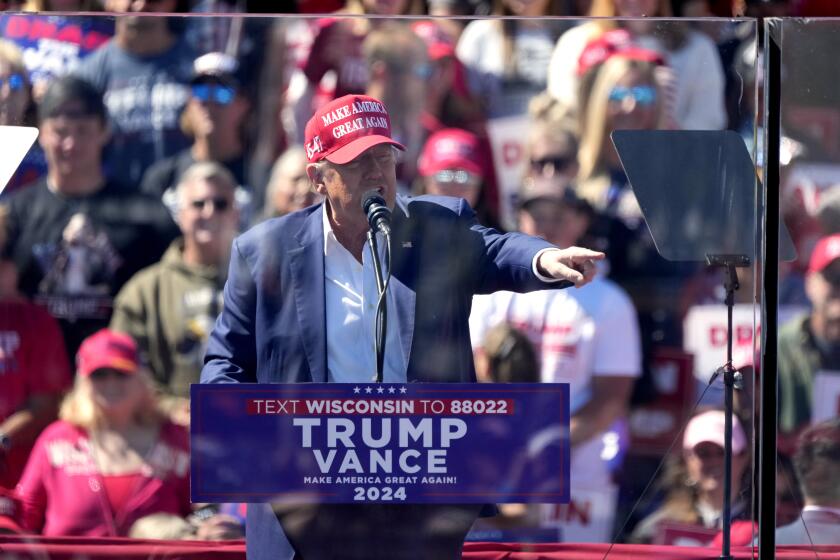Rift With Europe Runs Deep
Europeans think Americans are ignorant, bullying, greedy, trigger-happy barbarians. Americans think Europeans are snobbish, cowardly, bureaucratic, decadent, traitorous wimps.
That, at least, might be the conclusion drawn by a visitor from another planet these days. The Iraq crisis has brought the relationship between the United States and Europe to new lows, unleashing ugly instincts and shrill voices on both sides.
U.S. congressmen and comedians have rediscovered the joys of French-bashing. Antiwar marchers in Spain last weekend declared that President Bush was worse than Hitler and that the United States kills for oil.
It seems hard to believe that the United States and Europe are actually old friends and partners and that their alliance is at the heart of a Western culture based on personal liberty and political democracy.
Optimists, including White House officials, predict that this spat between Europe and the United States will prove temporary -- like their disagreements over Vietnam, or NATO missile deployments during the Reagan era -- and is inevitable among democracies.
But others wonder if the dispute over Iraq is a symptom of a schism that has deepened since the end of the Cold War. Some Europeans foresee a split with the United States, as increasingly hostile cultures disagree over fundamental values and issues: war, guns, the death penalty, the role of religion in everyday life.
“The biblical references in politics, the division of the world between good and evil, these are things that we simply don’t get,” said Francois Heisbourg, director of the Foundation for Strategic Research, a Paris think tank. “In a number of areas, it seems that we are no longer part of the same civilization. You have a fairly religious society on one hand and generally secular societies on the other operating with different references. What would unite us does not seem to be in the forefront.”
Similar sentiments could be heard on the streets during last weekend’s huge antiwar marches in Europe. The chants and picket signs denounced the Bush administration with a venom that even outdid the longtime tradition of anti-American rhetoric here.
Andrea, a 24-year-old activist among the million-plus marchers in Rome on Saturday, said he was protesting against the government in Washington, not the people of the United States. The demonstrator, who declined to provide his last name, followed that distinction with the opinion that the Sept. 11 attacks resulted from unjust U.S. policies.
“The terrorist attacks that happened were due mainly to the American politics and not so much to a prejudicial anti-American sentiment,” he said. “Certainly if you bomb kids, schools, bridges under the flag of justice and human rights, you have to expect some crazy person will respond.”
Such talk hints at trouble ahead for the “beautiful friendship” -- in the memorable words of Humphrey Bogart to Claude Rains at the end of “Casablanca” -- that bonded Americans and Europeans in the 1940s.
Millions of Europeans expressed solidarity with the United States after the Sept. 11 attacks. But there were also voices declaring that the world’s only superpower had been punished for its arrogance.
In the days just after Sept. 11, 80% of the callers to one of France’s top call-in radio shows declared that the attacks “were well done, it served the Americans right,” said Christophe Hondelatte, the host of the show on the RTL network. Hondelatte said he decided not to broadcast the calls because he thought they were offensive and inappropriate.
“It was incredible,” he said. “It showed me how strong anti-Americanism is here.”
Even sympathetic Europeans, analyst Heisbourg said, might not grasp the trauma the World Trade Center carnage inflicted on the American psyche.
“They don’t understand what 9/11 meant for the U.S. -- a terrible shock that affects the whole world outlook of Americans,” he said.
Nonetheless, most protesters interviewed Saturday said they do not despise Americans, just their current leaders. And ideology plays a basic role in the transatlantic rift.
Most Europeans, whether leaders or voters, are well to the political left of the Bush administration, especially on foreign policy.
French President Jacques Chirac is a veteran center-rightist who was elected on a law-and-order platform, but France’s independent approach to what it sees as U.S. domination of international affairs has propelled him to the forefront of the antiwar bloc at the United Nations.
Antiwar feeling is among the strongest in Spain and Italy, which have center-right governments. Prime ministers Jose Maria Aznar of Spain and Silvio Berlusconi of Italy are popular and skillful politicians, but voters across the spectrum scorn them for backing Bush on Iraq.
“The American and European people don’t want war, but their leaders want to change the governments in Arab countries so they can get better access to oil,” declared Ana Rosa Morales, a 35-year-old psychologist in Madrid. “This war will cause terrorist attacks, but the leaders who support Bush won’t abandon him because of that. Bush is one thing, and the American people are another.”
Personality exacerbates the problem.
Right or wrong, Bush has an image here as a reckless maverick whom Europeans find both mystifying and alarming.
“The level of distrust, not simply among European public opinion, but at the leadership level, and the lack of confidence in the Washington team is simply abysmal,” Heisbourg said.
Guy Delranc, a retired insurance company publicist who joined the antiwar march in Paris, blamed U.S. leaders for fanning nationalism.
“The American government is extremely arrogant,” said Delranc, 57. “Some intellectuals think differently, but they don’t have the same impact on opinion in the U.S. that the French intellectuals have in France. If you look at the U.S. press these last days, you’ll see how they attacked the French. Not politically but in a vulgar and incredible way. Here in France, you don’t see that in the newspapers.”
Delranc’s comment does not appear to be completely true. Bush and his aides are preferred targets for the French press because many Europeans disagree with the administration’s policies on issues ranging from the economy to gun control and abortion and see them as confirmation of common caricatures of America.
Would there be less tension if a Democrat was in the White House? Perhaps on the surface. But analysts on both sides of the Atlantic say more powerful currents are eroding the foundation of the transatlantic alliance.
Religion now tends to divide rather than unite the West, according to analysts. Europe has become more secular in recent years, including the southern part of the continent, where the Roman Catholic Church’s influence on everything from marriage to education has declined.
As a result, Europeans are uneasy with the prominent references to God in U.S. politics, let alone what they perceive as the crusader-like tone of the Bush administration.
In a bitterly sarcastic article published in the Times of London last month, the novelist John le Carre declared that fundamentalist Christianity has pushed America into a period of “historical madness.”
Some European intellectuals reject the U.S.-gone-mad camp.
Jean-Francois Revel, a curmudgeonly titan of French political thinkers, published a book last year titled “The Anti-American Obsession.” His thesis: Anti-Americanism today expresses the revenge of a defeated, but still pervasive, European left that never forgave the United States for winning the Cold War and exposing what he calls its bankrupt ideology.
Revel and others say Europeans are hypocritical because they still expect U.S. military might to save their bacon if they are ever threatened.
Silvia Figini, a Spanish sociologist at the Madrid march last week, put it this way: “If there is a war in Iraq, the opinion that Europeans have of Americans will still be exactly as ambiguous as it is now, unfortunately: ‘How terrible that they attacked -- what warmongers -- but it’s a good thing that they are there for us.’ ”
*
Achrene Sicakyuz of The Times’ Paris Bureau, Cristina Mateo Yungas in Madrid and Nancy Meiman in Rome contributed to this report.
More to Read
Sign up for Essential California
The most important California stories and recommendations in your inbox every morning.
You may occasionally receive promotional content from the Los Angeles Times.










